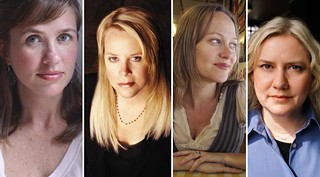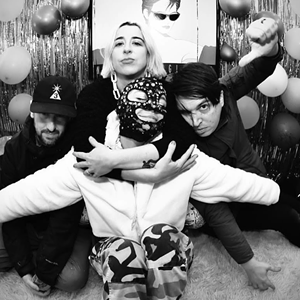The greatest honor an author can receive is when their work not only reaches, touches and moves people, it flourishes over generations and continues to inspire long after the writer herself has moved on.
This is certainly true of Eudora Welty (1909–2001), the Mississippi–born novelist and short story writer whose languid, seemingly effortless prose not only brought her the Pulitzer Prize for literature, the Presidential Medal of Freedom and other plaudits, but established her as one of the most admired writers of the American South, in the company of Flannery O’Connor, William Faulkner and Harper Lee.
The 2010 Savannah Book Festival honors Welty with a one–of–a–kind concert performance from four of America’s most literary–minded singer/songwriters, all of whom acknowledge a large debt to Jackson, Mississippi’s most famous daughter.
Mary Chapin Carpenter, Kate Campbell, Caroline Herring and Claire Holley perform — together — Saturday at Trinity United Methodist Church.
The program, titled Celebrating Eudora, has only been presented twice before: Last April, at the Eudora Welty Foundation’s celebration of the author’s centennial in Jackson, and again in September at the AJC Decatur Book Festival in Decatur, Ga.
The show finds all four women and their acoustic guitars, in a semi–circle, playing and singing together, in solos and in smaller groups. They each write story/songs imbued with the sort of grace, grit and pointed nuance that Eudora Welty was famous for.
The players
Mary Chapin Carpenter. The five–time Grammy winner is best known for country–tinged hit records like “Passionate Kisses,” “He Thinks He’ll Keep Her,” “Down at the Twist and Shout” and “I Feel Lucky,” but she’s also one of the country’s finest architects of lyrical, introspective folk songs and character–driven story/songs. The Washington, D.C. native’s 1992 song “Halley Came to Jackson” is a musical re–telling of one of Welty’s most poignant memories from youth, and in 1998 Carpenter wrote a children’s book with the same title. She currently sits on the board of the Eudora Welty Foundation, and will release a new album, The Age of Miracles, in April.
Kate Campbell was born in New Orleans and spent her formative years in the Mississippi Delta area before moving to Nashville, where she still resides. She’s recorded country, pop and rhythm ‘n’ blues, but her admitted forte is story/songs that mine the rich veins of southern character and virtue. Her poetic language is often compared to that of Flannery O’Connor and yes, Eudora Welty. Campbell’s most recent album, Save the Day, features guest vocals from Nanci Griffith, John Prine and Mac McAnally.
Claire Holley. Born and raised in Jackson, the very same Mississippi town where Eudora Welty spent nearly her entire life, Holley began playing ukulele as a small child, strumming away in the family’s hot car between Sunday School and church services. Now living in Los Angeles, Holley has released six independent albums, including one (Live at St. Andrews) in collaboration with her friend and fellow Mississippian Caroline Herring.
Caroline Herring carved herself a special place on the highly competitive singer/songwriter and alt/country scene in Austin before relocating to Decatur, Ga. seven years ago. Herring, who played the 2009 Savannah Music Festival, grew up in Canton, Miss., just 20 minutes from Jackson. She has a keen, literary eye for detail, and her songs are like paintings that spring suddenly to life (her work is commonly referred to as “Southern Gothic Folk”). “Tales of the Islander,” from her most recent album Golden Apples of the Sun, is an intimate if slightly abstract interpretation of works by Mississippi painter Walter Anderson. Herring attended the University of Texas to earn a Ph.D in American Studies and folklore. “I started doing music so much,” she sighs, “that eventually, I just stopped doing school.”
The interview
OK, how did all this start?
Kate: The Eudora Welty Foundation came to me with this idea of some sort of concert for her centennial. I thought “Why don’t we have a ladies’ guitar pull?” Where we really celebrate Eudora, but also as women. I knew that Chapin had worked with the foundation, and that she had written “Halley Came to Jackson,” but I also thought of Claire and Caroline, who are from Mississippi. I thought this would be a very cool thing. And it is.
I think we all appreciate Eudora, as a writer, and her humor, and everything she brought, but also as a woman writer.
Caroline: I knew Claire, but I didn’t know she was asked to be part of the show until I was asked to be part of the show. I had never met Kate and I had never met Mary Chapin. At first, they were going to have us all playing one after the other. And we all thought “Hmm, that could be kind of boring.” So Kate and Claire and I proposed that three of us do it in the round for the first half, and then Mary Chapin could do the second half with her trio.
Her management said “No, no, she wants to do it with y’all.” And she is so generous, so nice, and sings on everybody’s songs.
Mary Chapin: I always wanted this to be a communal experience; the way it was structured initially wouldn’t be conducive to sharing, talking, singing together, et cetera. I don’t think it was my idea as much as it was just so obvious that this was the right way to present ourselves as we tried to honor Eudora during that first concert in Jackson.
Now the nice part is that even though the centennial of her birth was last year, the various book festival venues that we have reconvened at are a perfect audience for this kind of thing. You don’t need to be a great scholar of Eudora’s work in order to enjoy the concert — it is freewheeling and spontaneous and it includes music from all sorts of influences. It’s the spirit of connection, the power of the stories, the similarities and the differences between us and the things that draw us toward each other that make me feel so fortunate to be a part of it. I adore these women and their songs.
Did the works of Eudora Welty resonate with you early, or did you come to discover them later in life?
Claire: You know, even though I was aware of her presence in my hometown and I even saw her at the grocery store once, it wasn’t until later on in my adult life when I’d moved away from Mississippi that I sunk my teeth in her work. I really loved her short stories like A Visit of Charity, and that wonderful piece about the piano student Virgie Rainey, June Recital. I remember laughing out loud at a park in Los Angeles reading One Writer’s Beginnings. You could just hear Eudora’s speaking voice and she was talking about things that I knew.
Mary Chapin: I think it must have been in high school when I first read one of Eudora’s stories. However, when I later discovered One Writer’s Beginnings it became a treasured guide to the importance of finding and listening to your true voice, as a person and as an artist. At the time I was working at part–time jobs in D.C. and also trying to get a foot in the door at local music clubs. Her journey to becoming a writer was inspirational as well as instructional for someone like myself; I wasn’t all that sure what I wanted to do with my life but I knew that I wanted music to be a part of it. This book helped me understand that probably the most important part of my love of music was songwriting, and it helped me realize the importance of developing the tools to do that.
Caroline: I grew up with her books in my house. My mom’s a librarian, and a collector of first editions, and so prized possessions in our house were those Welty books. So I’ve always known of her, and I studied literature and history in college. I became a “literate songwriter from the South,” so it means everything.
Once I took a foreign exchange student to Ms. Welty’s house to meet her. And Ms. Welty let us in, and gave my friend a book of her poems in French, which was the language that she spoke. We talked for a long time. She was a very generous person.
Chapin, you met Eudora too, didn’t you?
Mary Chapin: She invited me to tea! It was a lovely afternoon, visiting her at her home in Jackson. She gave me a book about Cajun music (I think perhaps “Down At The Twist And Shout” was popular at the time) and my memory of our visit is warm and treasured. I believe I was quite tongue–tied...
What would you say makes a “Southern writer”? Is it visual? Is it a matter of genuine–ness?
Claire: Perhaps, someone who has the capacity to absorb the sounds and textures of the region and has figured out a way to incorporate that into his or her work, so that it is almost as though you’re hearing familiar music when it is read (or sung) aloud. Lewis Nordan’s Music of the Swamp is an obvious example.
Kate: I remember that when I re–read Eudora, started encountering her again 20 years after college, it was kind of like comfort food. I realized that she was writing the way I talked. And I love all southern literature, but she is my absolute ... she’s the one I relate to the most. And it has everything, I think, to do with the language.
When she passed away, I decided to read one of her short stories every night, kind of in honor of her and her writing and her life. And it had the same effect as it had 10 years earlier. I really like Flannery O’Connor, but she’s just a whole different being from Eudora. Eudora’s language really resonates with me.
Sometimes people come up to me after a concert, or they have one of my CDs, and they say “I just wanted to say thanks, because you’re writing my life.” I think that no matter what region we’re from, when we connect to an author, or a painter or a musician, they’re somehow touching something we can’t even describe. It’s that other layer. The best way I’ve come with to explain it is this notion of “comfort language.” It’s speaking the way I speak. And in some cases it’s what Eudora’s not saying – it’s the whole culture, and it’s something you can’t really speak. It’s almost what’s between the lines.
What do you like about these shows? What makes this different from a regular performance, for you?
Claire: Getting to sing harmony with these accomplished singers. What a treat. People in the audience seemed to enjoy the camaraderie and banter among the four of us on stage. It seemed natural to do it again, and I think there was an interest and desire in all of us to continue the good thing we had going on that night in Jackson. While we have the common thread of all being female “singer/songwriters” I think there is enough variety of style to keep things moving and interesting on stage. And Kate will usually say something to loosen us all up – us and the audience.
Caroline: It hasn’t been exactly the same at the two shows we’ve done it. But those of us who’ve written songs based on her work, those are sung. And songs that we thought she might like. Songs about southern women. Songs about southern life.
Kate: I mostly tour by myself, not with other artists. So you get to sing harmony! The first time Claire and them started singing harmonies with me I thought “I’m gonna have to stop right now!” Because it was so great.
Mary Chapin: The friendships that I have now with Caroline, Kate and Claire are so treasured, and there is nothing like being able to sing with people whose work you simply love. I feel a camaraderie with them that feels like a gift, and let’s face it, being on the road is hard enough, so when you get to be out there with friends, you just have so much MORE fun.
At least I do ... I love the stories they tell on stage, the music that they make, well, it’s just simply a few hours of bliss for me to be a part of it. Even dull old sound check is fun. And the fact that it happens only now and then makes it all the more special.
Celebrating Eudora
Where: Trinity United Methodist Church, 127 Barnard St.
When: At 8 p.m. Saturday, Feb. 6
Tickets: $50
Phone: (912) 525–5050
Online: www.savannahbookfestival.org
































